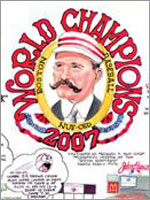
The Last Stage of Elimination
Oct. 12, 2006 -- As the baseball world bid good winter to another four teams this past Columbus Day weekend, Red Sox partisans had cause to reflect on our teamís own mortality. Is elimination easier to accept when it comes quick and without warning as at the hand of a wild card limping into the postseason, or after a long and painful bout with woeful pitching and anemic hitting?
For Bostonians, last Saturdayís Yankee Elimination Day was like a second holiday in the same three-day weekend. But for long-suffering Yankees fans whose last October triumph predates those of both the Red Sox and White Sox, it is a hard swallow. When your roster is full of All-Stars, future Hall-of-Famers, and home run derby champions, and your Number 8 hitter is a two-time MVP with a $25 million salary, you must win. The lofty expectation is a small price to pay for a table tilted so much in your favor, for an economic ability to acquire any player you want and retain every player you acquire. Nevertheless, Yankee Fanís pain is of little concern in New England. We have our own.
September 23 marked the mathematical elimination of our 2006 Boston Red Sox, but their spiritual exodus occurred long before. Agonizingly long before. It may have come a month earlier, when Mark Loretta lined out to Robinson Cano and sealed the Yankeesí five-game sweep, or perhaps nine days later in Oakland as Curt Schilling was chased off the mound during the low-water mark of a 2-7 road trip. It was different for everybody, that personal epiphany that our Friends in The Fens were a not-so-cheap imitation of an AL pennant contender, a malnourished frame to which National Leaguers and the Baltimore Orioles added ten pounds much like television does to bulimic actors.
Over that last month, I witnessed the progression of antecedent stages betrayed in the voices of friends, peers, talk show brethren. Denial (they still play 18 of the last 29 games at home while the Twins and White Sox are beating each other up). Bargaining (if they can just make the playoffs with all these injuries, itíll be a moral victory). Anger (why did they sit back and let Bobby Abreu go to the Bronx?). Despair (theyíre ruininí my summah!). Finally, most accepted failure and moved on to the Patriots and BC Eagles. But not me.
My own acceptance didnít come until the last Wednesday of the season. Thatís when I lost it during an innocuous 11-0 drubbing by Tampa Bay.
Maybe it was that riveting battle for second, or Josh Beckettís personal battle for respectability, or just a desperate grasp at fading rays of summer, but I declared war on the futility of the past season during that final week and I expected to win out. Besides, on that particular night my sons were still on the football field and I was alone with only my car radio for company. Acceptance was not going to happen until I got past the anger.
That final home stand opened with Tampa Bay, the worst travel team since Napoleonís army fled Russia in 1812. The Devil Rays had won only one of their last 20 road games and were 19-57 on enemy soil this season. Sox-killiní Scott Kazmir was being ducked, while the Red Sox had their co-aces lined up, even if this label could only be applied relatively.
Beckett was on the mound. Heíd won his last two decisions and had a 2.70 ERA over his last six outings. After a leadoff infield hit, he retired two hitters on two pitches. Then, after dodging a bullet when the immortal Greg Norton hooked one to the foul side of the just-christened Peskyís Pole, the stubborn Beckett hung an identical fastball on the next pitch, which Norton, like 34 hitters before him, drove further and straighter. Beckett would later surrender another, making it 36 homers allowed on the season.
Now, a two-run jack in the first inning should not be a formidable deficit to overcome, especially against a pitcher like the Raysí Tim Corcoran, 0-9 since the All Star break. However, when this yearís Sox fell behind by even one run in the first, they ultimately won only 13 times against 25 losses. When trailing by two runs at any point in the game, they were 21-67.
Nor could this team reap dividends from bad pitching. Corcoranís soft-tossing teammate Casey Fossum (2-0 with a 1.16 ERA vs. Boston; 4-6 and 6.24 vs. the rest), Torontoís A.J. Burnett (2-0 and 2.25; 8-8 and 4.28), and the late Cory Lidle (2-0 and 2.25, 10-10 and 5.05 with both the Phillies and Yankees) all found Boston the silver lining to mediocre seasons. Burnettís teammate, Gustavo Chacin, went so far as to make it his yellow-brick road. Chacin was a mere 5-4 with a 5.56 ERA against other Major Leaguers, but he posted a 4-0 record against the Red Sox with a 3.43 ERA.
On this Wednesday night, Corcoran allowed just four hits in 6 2/3 innings, lifting him to 2-0 and a 1.35 ERA in his two starts against Boston. The rest of baseball found him a bit less mesmerizing; he went 3-9 with a 4.91 ERA against teams not from Massachusetts.
The game marked Bostonís ninth loss to the lowly Devil Rays, capping a 17-20 record against the A.L.ís three last place teams; their 34th loss in the A.L. East, dropping them into third place; their 46th loss overall in the last 80 games; the 22nd loss in 41 home dates since the All-Star break; and their eighth shut-out. It was the 37th time they were held to less than three runs (8 wins, 29 loses), and the 22nd time they were held to five or fewer hits (3 wins, 19 losses).
Thatís not to say there werenít base runners. Corcoran walked five, including David Ortiz three times. Big Papi started 19 of the 20 games since September 10th while his protector, Manny Ramirez, managed five plate appearances. During this stretch, Ortiz walked 26 times. Yet, despite 43 base appearances and stratospheric .524 OBP, he scored only 15 runs - seven from his own homers. Such futility was symptomatic of a club that hit only .259 with runners in scoring position, a chasm apart from its past. In their three-year playoff run, the Red Sox never hit less than .289 with runners in scoring position.
Of course, a run saved is as good as a run scored, as GM Theo Epstein observed in an interview on WEEI a week back. Although sabermetrically correct, he was remiss in applying some weighting factor. There just arenít as many opportunities to save runs as there are to score them, routine plays aside.
The 2006 Red Sox committed errors only once every three games, going 22-32 when they did. The corollary is a 64-44 record in error-free games. Not bad. However, errors yielded runs in only 27 of those 54 games, yet the Sox still managed to win only 11 of the remaining 27 games. Whatís more, 18 of their flawless fielding games were won by margins of five or more runs, essentially rendering them error-proof victories. In fact, when Boston scored five or more runs, they were 67-21, a much higher correlation to victory than runs prevented. This yearís emphasis on leather would seem a smokescreen hiding a bankruptcy of punch at the plate. Next year, concerns over defense may be better left to Donald Rumsfeld.
Not that next year offers a quick return to glory if the late season returns from the farm system are any indication. With Mark Loretta and Alex Gonzalez gone and Hanley Ramirez in Florida, the seemingly rich farm offers only infield star-of-the-future Dustin Pedroia (.191, 7 RBI in 89 AB in 2006). Nor is there an heir-apparent to Trot Nixon. While Jonathan Papelbon will strengthen the starting rotation, Craig Hansen (38 IP, 6.63 ERA) is not ready to take the ball in the ninth. John Lester and Manny Delcarmen remain question marks. And to think we once chuckled when the supposedly inferior Yankees farm system produced names such as Chien-Ming Wang, Robinson Cano, and Melky Cabrera.
But with thoughts of spring come feelings of hope. And in Red Sox Nation, hope is the last stage of elimination. After all, we can always wait ítill next year. We once did it 86 winters in a row.
-- Bob Ekstrom, Boston Dirt Dogs contributor and writer at Sports Central














